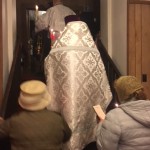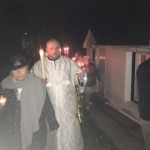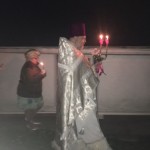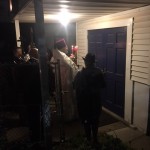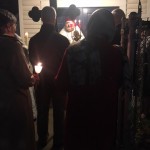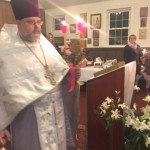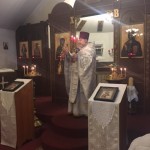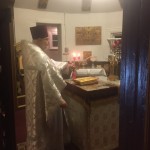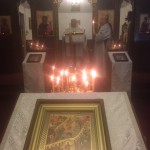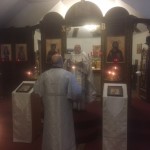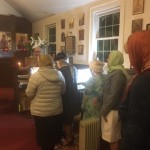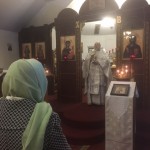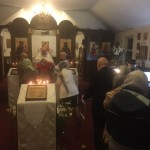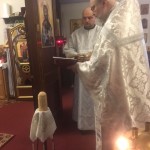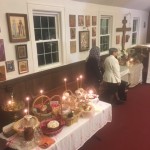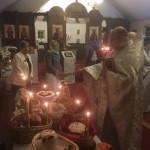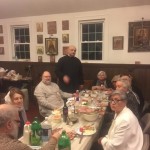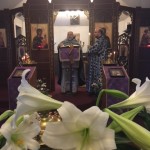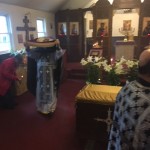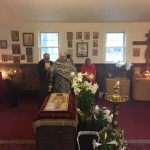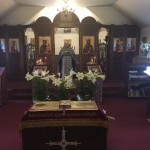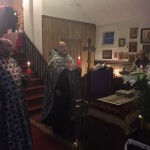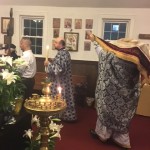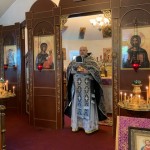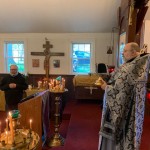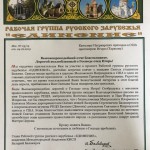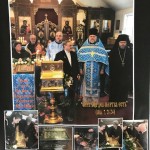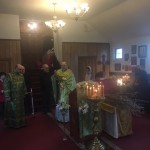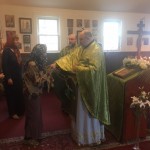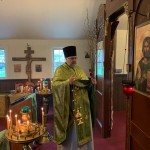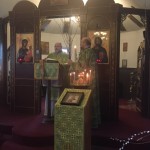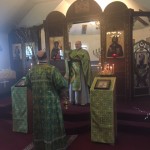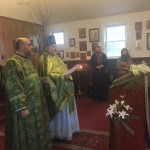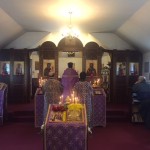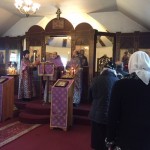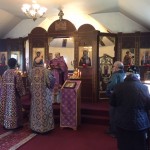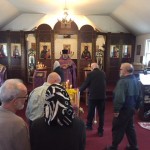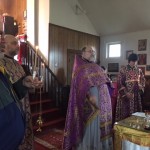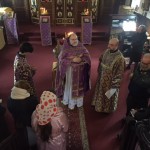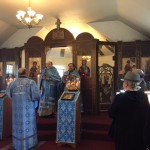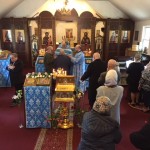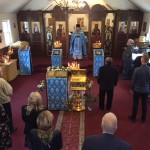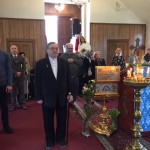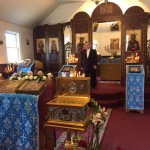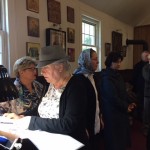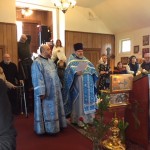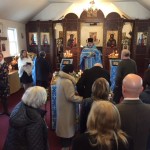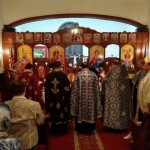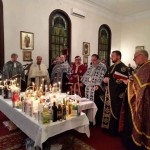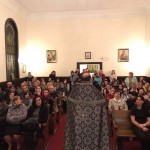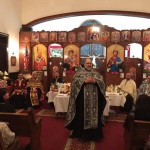On April 26, on the Holy and Great Friday we had two special services in our parish temple. This day is the most sorrowful day in Christian calendar. On Holy Friday we commemorate crucifixion of our Lord Jesus Christ, His death on the Cross, as well as His burial. St. George Church’s Rector, Archpriest Igor Tarasov served Vespers with the procession of the Shroud at 4:00 PM.
After the readings from the Scripture which included three lessons from the Old Testament, then an Epistle and a Gospel lesson from the New Testament, the Rector preached a homily in Russian. An English translation of that homily is as follows:
“Today is the Great Friday, the day of universal sorrow, a day in which it befits everyone to keep silent, to refrain his thoughts, his language, his feelings.”
“Great Friday is the day of great sorrow. What are we grieving about? On this day we mourn the death of our Savior, Lord Jesus Christ. And now, reflecting upon this most sorrowful event in the history of mankind, we can see that the cause of Christ’s death was our human malice.”
“Today we have heard a lengthy reading from the Gospel which describes all the sufferings of Christ, His death on the cross and His burial. And of course, this reading causes grief in our hearts. But let us think what is especially sad if we talk about us, the people.”
“On that day, almost none of the close Disciples happened to be near Christ. One Disciple, Judas, betrayed Him. Another disciple, Peter, denied Him three times. All the others scattered in fear. Only one Apostle, St. John the Theologian, came to Calvary, to the Crucifixion, and stood there with the Mather of Christ, the Most Pure Theotokos. There were also women present, the female disciples of Christ. But most of the Apostles were absent. The Lord was left by them. Christ did not leave them, but they left Him.”
“If it were the other way around, it would be terrible. After all, there is nothing worse for man than being left by God. There is nothing more terrible for a person than to become abandoned by God, that is, if you lose God in your life. Human soul cannot live without God, and it dies and decays spiritually. And a man without God ceases to be a man, loses the image and likeness of God; and instead of being a god-like creature, it becomes a demon-like creature. There is nothing worse than being abandoned, but it happens when a person himself leaves God. God never wants to leave man. God always wants to be with us. God always wants to bless us, to give us strength, strengthen us, to be with us always.”
“But we often leave God. We leave Him if we sin. We leave Him if our life goes without memory of Him. Therefore, dear brothers and sisters, let us reflect in spiritual silence and contemplation of the greatness of the Golgotha redemptive sacrifice of Christ, what is our fault that the Lord was ascended to the Cross.”
“Thus, we now stand before the Holy Shroud, but spiritually stand before the Holy Tomb of the Lord. The Disciples of the Lord left their Teacher. They left Him, He did not leave them. They scattered in fear, He did not betray them. And when the Crucifixion was accomplished, the death of Christ took place on the cross, only two secret Disciples, Joseph of Arimathea and Nicodemus, dared and came to Pilate, the governor, and asked for body of Jesus. And the secret Disciples were not afraid to perform the burial of their Teacher. The open Disciples were afraid to be with Him.”
“We consider ourselves open disciples of Christ. We call ourselves Orthodox Christians and truly desire to be such. Let us ask ourselves a question: “Do we not leave God in our lives? Are we not turning away from Him? Are we not afraid to be Christians? Are we always worthy of our great title? Do we not run up in fear if we need to witness to the truth of Christ?””
“And let no one of us have a proud thought that this does not happen to us. We are not holier than the Holy Apostles. Nothing human is alien to us, and first of all, sins are not alien to us, sins that separate us from God, sins that kill our soul. But in our sins, God does not leave us.”
“There is nothing worse than being abandoned by God. When a man leaves God, he ceases to be a man. Let us not leave God. Let us bow down before the Tomb of Christ, let us spiritually bow before the Savior of the world, Who voluntarily laid down in a tomb. Let us come and worship Him with a request, with a sincere prayer, that we never leave Him, our Savior and our God, but that we always live with Him.”
At the end of the Vespers holy Shroud had been solemnly carried out from the altar to the middle of the church and placed there for veneration.
At 7:00 PM the Rector celebrated Matins on the Lord’s Tomb. Most of this service was performed before the Shroud placed in the middle of the church. After the Great Doxologion the Rector, altar servers and parishioners performed the procession. Since it was raining outside, the procession took place only inside the temple. The priest carried the holy Shroud resembling burial of the Lord.

